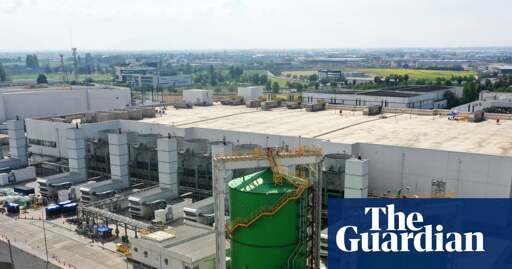Tech companies’ use of Pfas gas at facilities may mean datacenters’ climate impact is worse than previously thought
Two kinds of cooling systems are used to prevent the semiconductors and other electronic equipment stored in datacenters from overheating. Water cooling systems require huge volumes of water, and chemicals like nitrates, disinfectants, azoles and other compounds are potentially added and discharged in the environment.
Many centers are now switching to a “two phase” system that uses f-gas as a refrigerant coolant that is run through copper tubing. In this scenario, f-gas is not intentionally released during use, though there may be leaks, and it must be disposed of at the end of its life.
The datacenter industry has claimed that f-gas that escapes is not a threat because, once in the air, it turns into a compound called Tfa. Tfa is considered a Pfas in most of the world, but not the US. Recent research has found it is more toxic than previously thought, and may impact reproductive systems similar to other Pfas.
Researchers in recent years have been alarmed by the ever-growing level of Tfa in the air, water, human blood and elsewhere in the environment. Meanwhile, some f-gases are potent greenhouse gases that can remain in the atmosphere for thousands of years. But f-gasses are lucrative for industry: about 60% of all Pfas manufactured from 2019 to 2022 were f-gas



WTF? Have you ever been in a data center? They don’t release anything. They just… Sit. And blink lights while server fans blow and cooling systems whir, pumping water throughout.
The cooling systems they use aren’t that different from any office building. They’re just bigger, beefier versions. They don’t use anything super special. The Pfas they’re talking about in this article are the same old shit that’s used in any industrial air conditioner.
For the sake of argument, let’s assume that a data center uses 10 times more cooling as an equivalently sized office building. I don’t know about you, but everywhere that I’ve seen data centers, there’s loads and loads of office buildings nearby. Far more than say 10 for every data center.
My point is this: If you’re going to be bitching about pfas and cooling systems, why focus on data centers (or AI, specifically) when there’s all these damned office buildings? Instead, why don’t we talk about work from home policies which would be an actual way to reduce pfas use.
This article… Ugh. It’s like bitching that electric car batteries can catch fire, pretending that regular cars don’t have a much, much higher likelihood of catching fire and there’s several orders of magnitude more of them.
Are Pfas a problem? Yes. Are data centers anywhere near the top 1000 targets for non-trivially reducing their use? No.
Aside: This is just like the articles bitching about data center water use… Data centers recycle their water! They have a great big intake when they’re done being built but then they’re done. They only need trivial amounts of water after that.
Do you have a source on your claim that data centers recycle water? Because these researchers state that 80% of the water is evaporated, and the other 20% is discharged to municipal wastewater facilities.
Yeah. That’s recycled.
Water cycle counts.
Not when they keep building them into deserts. Also a lot of the rain falls into the ocean and is then salty. Waste of what is often essentially drinkable water.
2024 United States Data Center Energy Usage Report
Wouldn’t the argument being made be that those office buildings already exist, whereas the data centers for AI are being built new? So less of a it’s not a problem in offices and more of a we know this is bad so lets try to not build more of it?
Does anyone have the data on the total number of data centers that were being built over time? I’m not convinced that AI is causing that many more data centers to be built. From everything I’ve read, is just that they’re putting more GPUs into them.
Yo, STFU… You come across as an ignoramus. A simple search indicates a “boom” in AI data center construction.
Take your BS and eat dirt.
U can always trust the guardian to construct a misleading narrative that falls apart at the slightest bit of logic.